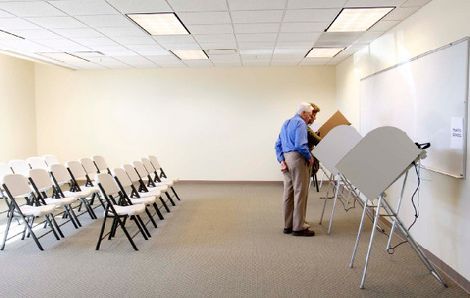This is an archived article that was published on sltrib.com in 2012, and information in the article may be outdated. It is provided only for personal research purposes and may not be reprinted.
With the trend toward fewer people voting and more money, each vote cast will be worth more money.
- Vote when it counts: Keep Utah primary voting open - Salt Lake Tribune Editorial
The price of having built a party organization that bestrides a state's political landscape is that there will always be some fair-weather voters who will want to join up at the last minute. When they might actually have a chance to influence the path of their county, state and federal governments.[Sort of like people who won't buy health insurance until they get sick. But that's a different matter. To be decided Thursday.]The Utah Republican Party has built such a colossus. But, judging by a legislative committee action taken Wednesday, it finds that its dominant club is not exclusive enough.Right now, Utah law allows a registered voter who is not formally affiliated with any political party to show up on primary election day, like the one coming up Tuesday, join the Utah Republican Party, and cast a ballot.Given that most districts are predominantly Republican, and that the November ballot so often includes either an unknown and underfunded Democrat, or no challenger at all, the primary is often the only game that matters. If voters want any part of that, they have to show up in June.Unfortunately, the Legislature's Government Operations Interim Committee voted 7-3, mostly along party lines, to allow the state law mandating such an arrangement to expire in 2013. That won't have an impact on this month's primary. But, come the elections of 2014 and thereafter, Republicans will be able to circle their wagons and have their nominating decisions made only by those who thought to affiliate with the GOP at least 30 days before the primary balloting. ...
Hey. Here's an interesting idea.:- A vote for 'none': Nevada ballot option helps voters, it doesn't disenfranchise them - Las Vegas Sun Editorial... Nevadans have a right to vote for "none of these candidates." Whether it's wise to vote for "none" is a matter left to the voters, and we trust Nevadans with that choice. Republicans should do the same and drop the lawsuit.
- Campaign gifts: Peter Cooke's plan for limits - Salt Lake Tribune Editorial
It's no surprise that Democrat Peter Cooke, who is running for Republican Gov. Gary Herbert's job, has proposed a $2,500 limit on individual campaign donations and a $5,000 limit for groups. Cooke is way behind in the money race, and limits would cut into Herbert's huge advantage.For the same reason, it would be surprising if Herbert supported limits, much like it would be surprising if a superpower agreed to sign an arms control treaty with a Third-World enemy.So far, Cooke has raised $150,000 compared to Herbert's $1.1 million.Put bare-knuckle politics aside, however, and Cooke's proposal, or something like it, is what Utah needs. Otherwise, elected offices literally are for sale. ...
Not that it's any better at the federal level:- Campaign finance laws completely toothless - San Jose Mercury-News Editorial
You might think that the laws forbidding coordination between politicians' own campaigns and outside advocacy groups would have prevented Karl Rove from speaking Saturday at a retreat for Mitt Romney's biggest donors. But Rove, whose Crossroads GPS is probably the most widely known advocacy group, was unfazed. That tells you all you need to know about the toothless nature of campaign finance law.As one lawyer put it recently, "The scandal in Washington is what is legal, not what is illegal. ...
And this doesn't help at all:- U.S. Supreme Court strikes 1912 state ban on corporate donations - Helena (Mont.) Independent-Record
HELENA—The U.S. Supreme Court, in a 5-4 decision released Monday, summarily reversed a Montana Supreme Court decision and decided that the state's century-old ban on corporate spending for or against political candidates is unconstitutional.SCOTUSblog reported the decision shortly after 8 a.m. MDT.A summarily reversal means that the state Supreme Court decision was overturned without the nation's highest court scheduling any briefing or oral argument on the legal controversy.It was a clear victory for American Tradition Partnership, the conservative group from Washington, D.C. The group had argued Montana's 1912 law was unconstitutional under the U.S. Supreme Court's 2010 Citizens United decision, which granted free speech to corporations and unions.Montana Attorney General Steve Bullock had been trying to carve out an exception to the 2010 precedent. He said the Montana law was passed as an initiative by voters in response to corporate corruption and domination of the state's political system by the Copper Kings in the late 1800s and early 1900s. ...



